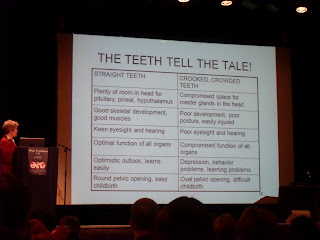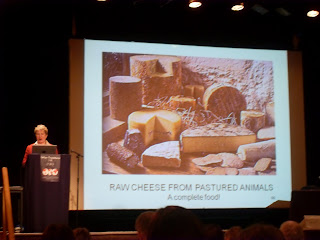 I've never really been much of a milk drinker. Despite piling on enough butter to leave teethmarks, my regular feastings on cheese, and a big taste for fresh yoghurt, milk has just never quite made it onto my personal hit list. It's essential in my tea, and a most welcome addition to the honey in my porridge. But drinking milk by itself has, for some reason, never really been my thing.
I've never really been much of a milk drinker. Despite piling on enough butter to leave teethmarks, my regular feastings on cheese, and a big taste for fresh yoghurt, milk has just never quite made it onto my personal hit list. It's essential in my tea, and a most welcome addition to the honey in my porridge. But drinking milk by itself has, for some reason, never really been my thing. Since first encountering the Weston A Price Foundation and reading more and more about Real Food and how far our contemporary diets have diverged from a diet that provides us with what our bodies actually require, I've read more and more about raw milk and the wonders it can do for our bodies. In its natural state, with all its enzymes and nutrients intact, raw milk is a true wonder food, full of goodness for old and young. Sadly, despite numerous attempts, I have been as yet unable to track down raw milk in Spain.
So, after having got time off work and spending a bomb on flights to come to London for the Weston A Price Foundation Day on 21st March (also nicely coinciding with a visit to my lovely family), I decided that drinking a glass of that pastured raw milk they had on sale was not an option; it was a necessity. I was getting that goodness that I'd been reading about for so long, even if it made me gag. I nervously got myself a 50p glass, ready to join those in the room swigging on their choice of cow or goat juice. The cow milk bottles even had a sticker saying how many calves had been born that week, and that they'd been frolicking happily in the fresh spring air. This was the milk I had been waiting for.
So I drank it, all of it. And I even slightly enjoyed it, slurping on the ice cold goodness as I sat back down to listen to the speakers of the day.
They were:
Sally Fallon Morell, the president of the Weston A Price Foundation, with skin that shines so healthily that I almost wanted to stroke at it when she signed my book;
Natasha Campbell-McBride, author of 'Gut and Physchology Syndrome' and expert in the links between gut flora and mental health issues;
Barry Groves, author of 'Trick and Treat' and a serious dispeller of erroneous contemporary health advice;
Sir Julian Rose, organic farmer and darling of the British raw milk movement, and
Jadwiga Lopata, campaigner against GMO foods in Poland and founder of the International Coalition to Protect the Polish Countryside.
This was a full-day affair, with a brilliant lunch buffet of raw butt ers and cheeses, Spanish chorizo, sourdough bread donated from artisan London bakers, beautiful salads, mineral salts, free-range chicken, and delicious salmon. In between the talks I wiggled excitedly around the various stalls, grabbing at WAP "Soy Alert" and "Butter is Better" literature, spending money I don't have on books and trying to work out if I could bring fermented cod liver oil back to Spain on a hand-baggage-only flight. The talks themselves were also hugely informative, and I left the day buzzing with new weaponry with which to further bore my friends and family. It also felt good not to be the only Food Nut for once; I was sat on a table with other people also obsessed with the links between diet and health, animal fats and happiness, and excuses to eat more cheese.
Sally Fallon Morell, whose work many of you will already be familiar with, discussed the work of Dr Weston A Price and its implications. Price was a Canadian dentist who in the 1920s, motivated by increasing levels of dental problems and deformities amongst his patients, travelled worldwide in search of a better understanding of the link between diet and disease. He studied the food cultures of many a society; all pre-industrial, more or less self-contained, what he termed 'primitive'.
The findings of his research are fascinating, especially in comparison to the low-fat diet mantras that we've been bullied with over the last few decades. He found societies populated by people with uniformly straight teeth, no decay or deformities and no overcrowding or need for braces or removals. Furthermore, these people were unaffected by the 'diseases of civilization' that were spreading through industrialised civilisations; tuberculosis, degenerative diseases and cancer amongst others.

Through his thorough research, Price came to the conclusion that those diseases and deformities that inflicted modern societies were caused by a change in diet that devastated the body. A move to more processed goods left behind the nutritiously dense foods with which past generations had maintained strength and immunity to diseases.
Perhaps surprisingly to many a person brainwashed by contemporary dietary advice, Price found that the common denominator through all of these vibrantly healthy societies was that they routinely consumed animal fats, often in high quantities. In fact, he argued that a healthy society that did not comsume animal fats was impossible to find. Not only are they essential to health, but they are the foodstuffs that contain the highest density of nutrients, and therefore should be eaten on a regular basis so as to achieve optimum health.

This was exactly my kind of talk; being encouraged to eat more of delicious organic bacon like that I bought from a farm near Segovia a few weeks ago, more butter and more fat is music to my ears. Not only that, but she also exclaimed her delight at the presence of so many young women in the audience, calling us 'the future' and highlighting the responsibility of others to provide us with support to reach optimal health so as to later produce some healthy sproglets. Another good call, if you ask me...

Sally went on to outline 11 key pointers for a truly healthy diet, gleaned from the work of Price and the Foundation she set up.
Her pointers:
1) No refined or denatured food (including pasteurised milk).
2) Regular consumption of animal products, including a generous dose of fats.
3) Looking for nutrient density. The diets Price analysed were extremely high in calcium, and around 10 times richer in fat soluble vitamins than a common diet these days. Examples of foods that hold high concentrations of nutrients are liver, seafood, meat or milk from pasture-fed animals, fermented foods and cod liver oil.
4) All cultures studied by Price cooked either some or most of their food. Animal foods were eaten both raw and cooked.
5) High levels of enzymes and benefical bacteria. Good sources are fermented foods, raw dairy (unpasteurised cheese is the easiest kind to find), raw meat and fish, and well-aged meat.
6) Properly preparing grains and seeds. Our simple, rumen-less stomachs need a little help by pre-digesting outside of the body, such as soaking grains.
7) Fat as a high proportion of diet. This, of course, means good-quality fats, of the natural animal type (ie not weirdo polyunsaturated vegetable oils that will bring you cancer not happiness)
8) Having equal amounts of Omega 3 and Omega 6. This is done by eating lots of grass-fed animal products, and fish.
9) Salt. I recently found out I am one unit under on my sodium count. Quite what a unit is, I don't know, but I am happily dousing my food with generous flings of natural sea salt. Sally explained that it is an enzyme activator, and is necessary to digest protein and food in general. Like everything, however, this is not just any salt. You need good quality mineral salt that has not been processed and denatured by use of industrial chemicals.
10) Regular consumption of bone broths. These are hugely beneficial to our bods, providing us with copious nutrients in a very accesible form.
11) Making special provisions for future generations, such as reserving the most nutrient dense foods for pregnant or breastfeeding women (or making special effort to care for young women: did you all catch that?!).
By the end of Sally's talk I felt like a uni student again, scribbling down notes and trying to process all of the information she was feeding us with. And this was only the beginning. The other speakers helped fill up my little notebook right up. For their multiple pearls of wisdom, however, you're going to have to wait a little longer. I am currently speeding my way through Natasha Campbell-McBride's wonderful book in honour of gut flora; more of which will be coming soon.

Me neither, i do love cheese but in don´t ever drink milk by itself.
ResponderEliminarIt´s weird how much i love cheese and how i do hate raw milk.
That's a great write up! Come and see us in September, we are hosting a conference again in the UK: http://www.naturalfoodfinder.co.uk/
ResponderEliminarwe also sell supplements in keeping with the Weston A Price foundation!